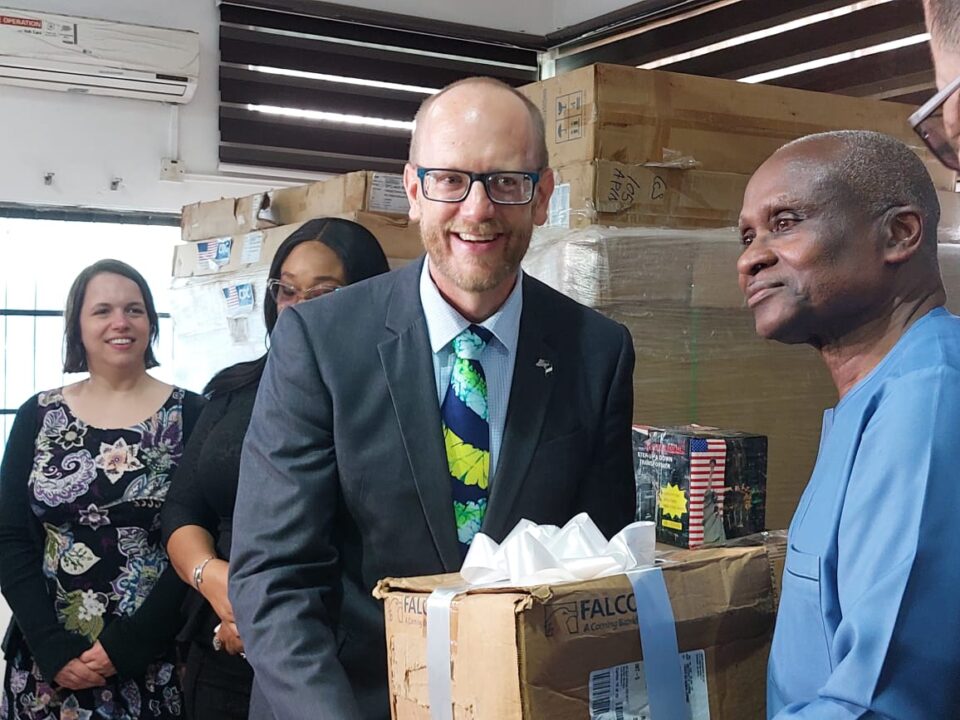By Cyriacus Nnaji
Director General, Nigeria Centre for Disease Control (NCDC) Dr. Jide Idris, has described the establishment of integrated laboratory diagnosis facility in Lagos is a game-changer.
Dr Idris took the stance at the launch of the Integrated Disease Testing and Surveillance Project at the Central Public Health Laboratory (CPHL), Yaba, Lagos on Friday 12th July, 2024.
He said “The establishment of the integrated laboratory diagnosis facility will be a game-changer in the fight against infectious diseases of public health importance in Nigeria, by providing accurate, early and comprehensive diagnosis. It will enable informative decision-making for enhanced patient care, proactive disease surveillance and outbreak management, optimize antimicrobial stewardship and reduced antimicrobial resistance, inform research and development for new diagnostic tests and treatments, improved patient safety and reduce healthcare costs, enhanced global health security through rapid detection and response, among others.”
Speaking also on the role of NCDC in protecting public health he said, “As you may know, the NCDC’s mission is to protect the health of Nigerians through evidence-based prevention, integrated disease surveillance, and response activities, using a one-health approach, guided by research, and led by a skilled workforce. In response to diagnosis-related challenges for the country’s prioritised infectious diseases, we have identified the need to develop capacity for advanced diagnostic services and laboratory-based surveillance capacity for Malaria, Neglected Tropical Diseases (NTDs), Mycotic Diseases, and similar diseases of public health importance,” Dr Idris disclosed.
He added that the main goal of this timely intervention through the NCDC/CDCF/TECRO Project was to further strengthen NCDC’s capacity. “This partnership with some of the disease programs of the FMOH; is to provide strategic leadership and coordinate national public health response strategies that support integrated disease surveillance, detection, characterization, prevention, and mitigation of priority diseases of global health significance.
Dr Idris said that Malaria, mycotic infections, and NTDs’ have, for far too long, imposed a significant burden on the communities, disproportionately impacting the most vulnerable and hindering development. “This facility will mark a pivotal step forward in our national health security strategy. It emphasizes NCDC’s unwavering commitment to protecting public health across the nation and by extension serving as model for countries in the region.”
He said that the establishment of the integrated disease laboratory signifies a paradigm shift and will add critical values through enhanced Diagnostic Capacity, adding that the CPHL Lagos will now be equipped with cutting-edge testing platforms, enabling them to deliver faster, more precise diagnoses of malaria and a broader spectrum of NTDs. This will translate to a revolutionized ability to detect outbreaks early, implement targeted interventions with greater efficacy, and ultimately, save lives.”
Speaking on the Robust Surveillance Systems, the D-G NCDC said, “The new facility will function as a central hub for the collection, analysis, interpretation and dissemination of data pertaining to laboratory diagnosis of priority infectious disease of public health importance, that are not in the current list covered by our National Reference Laboratory, such as malaria, mycotic infection and NTDs, to start with. This robust laboratory surveillance system will contribute significantly to generating real-time epidemiological insights, empowering us to make data-driven evidence-based decisions for disease control and prevention efforts. It will also serve as a critical component of our integrated disease surveillance and response (IDSR) system, geared towards early detection and response to outbreaks in a timely and effective manner. This is expected to ultimately contribute to reduction in the burden of these diseases on our communities and beyond.”
On capacity building he said that the establishment of the facility, will provide training and capacity building platforms for healthcare professionals to improve their competencies. It will serve as a regional hub for training of laboratory professionals, biomedical engineers (and other relevant personnel). The facility will also provide external quality assurance services, and laboratory-based disease surveillance for malaria, NTDs, & similar parasitic/protozoan diseases of public health priority within the West African sub-region.
His appreciation went to the partners whose efforts made the laboratory possible. “As we mark this significant milestone, I would like to express my heartfelt appreciation to the Taiwanese government (TECRO) through our strategic partners the US-CDC, CDC Nigeria, CDC Foundation, and APIN for the technical & financial resources, your commitment, support and all you are set to do, to see to the realisation of this project. Our collaboration is a testament to the power of strategic partnerships in driving systemic change. With our collective expertise, resources, and support, this partnership will again demonstrate the power of collaboration in achieving common goals and driving shared vision into reality.
Speaking on evidence based testing and treatment, Prof Akin Abayomi, the Honourable Commissioner for Health, in his Goodwill Message averred that it is very important to continue to strive toward evidence based practice medicine and that involves making correct diagnosis and treating appropriately without the risk of over treating or under treating.
Prof Abayomi stated that Malaria is one of those classic diseases where we incline to a chemical diagnosis, and anybody with a little bit of body pains and headache is malaria, and that has significant implication, chemically. He further stated that Lagos as a state is trying to drive the culture of testing and treating with positive result.
He added that a reference malaria laboratory in Lagos funded by partners is really a right step in the right direction. “It is going to drive that collaboration between the federal and the state public health laboratories. Now I know that the federal government is unable, because of resources, to operate in every state at the grassroots level, so this is a reverence laboratory, capacity transfer must happen from here to the state public health laboratories, so that we can be empowered as a state, and we don’t need to put undue pressure on the Centre for Disease Control.”



